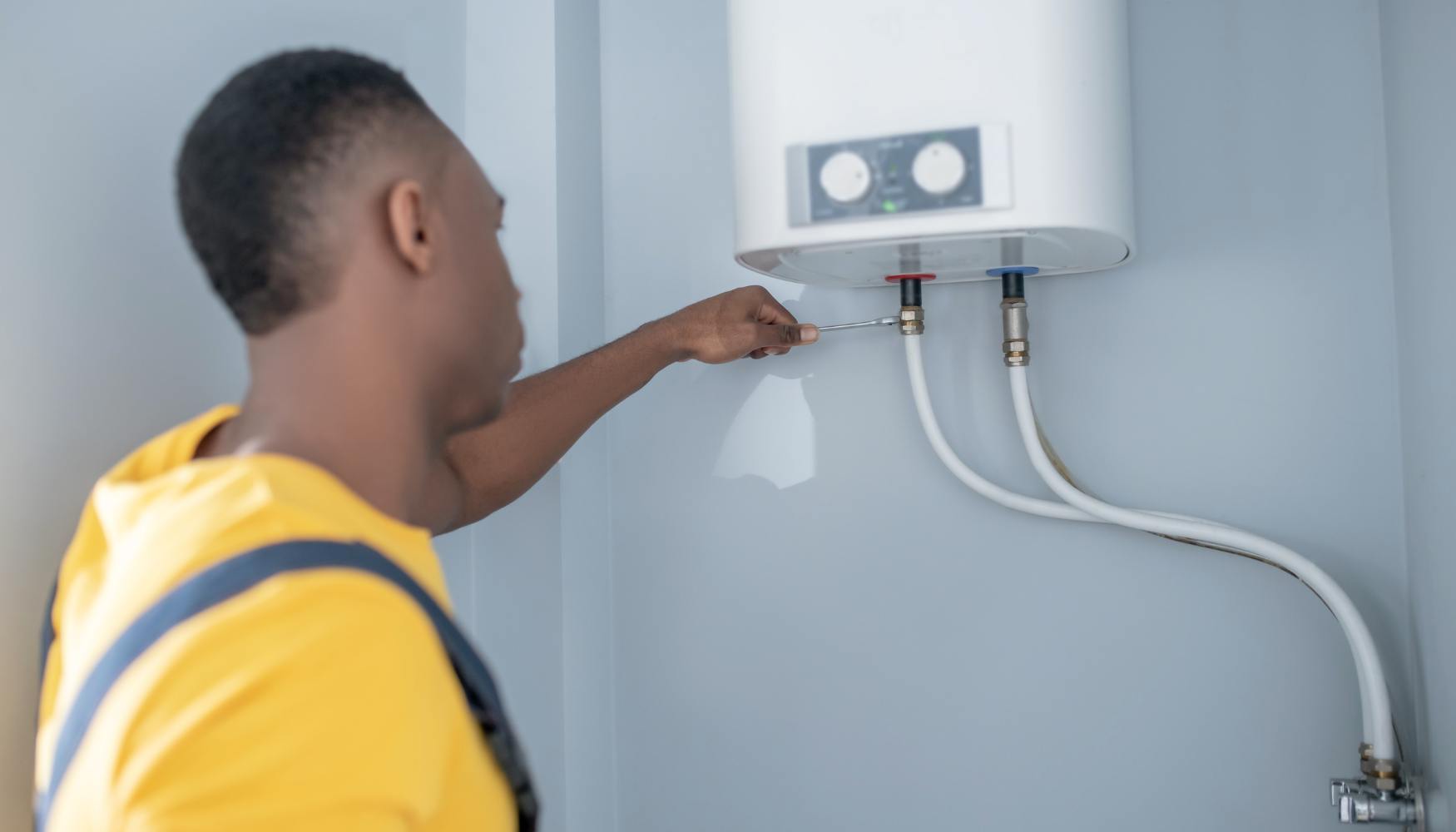Your Overview To The Gains Of On-Demand Water Heaters
Your Overview To The Gains Of On-Demand Water Heaters
Blog Article
On this page below you can find more helpful ideas with regards to Pros and Cons of Tankless Water Heater.

In a world where convenience and efficiency preponderate, it's no surprise that house owners are constantly on the lookout for smarter ways to manage their home's energy consumption and comfort. One advancement that has actually progressively gotten popularity is the tankless hot water heater. Yet what exactly makes these systems stand apart from the standard tank-based models the majority of us grew up with? Let's dive in and discover the advantages of tankless water heaters, assisting you determine if it's time to make the button in your house.
Introduction
Photo this: you enter the shower after a long day, expecting a relaxing cascade of hot water, just to be welcomed by icy beads since the last individual utilized all of it up. Noise acquainted? Conventional water heaters store a fixed amount of warm water, suggesting you go to the grace of that container's supply. Tankless systems, on the other hand, warmth water as needed. Say goodbye to running out mid-shower, no more fumbling with timetables just to guarantee warm water is offered.
Comprehending Tankless Water Heaters
What Are Tankless Water Heaters?
Tankless water heaters, often called on-demand or instantaneous water heaters, supply warm water just as it's required. As opposed to saving gallons of pre-heated water, these systems kick into activity the minute you activate the faucet. Water goes through a warm exchanger, warming up in real-time, indicating you get a continuous circulation of hot water without the demand for a huge container sitting lazily by.
Exactly how Do They Vary from Traditional Solutions?
Conventional heaters hold a reservoir of warm water, using power to maintain that tank at a consistent temperature. Tankless units remove the standing supply, reducing thrown away power and the large footprint of a huge cyndrical tube. Essentially, you're upgrading from a "stockpile" attitude to a "made-to-order" strategy.
Typical Types of Tankless Devices
Tankless hot water heater normally can be found in two ranges: gas and electrical. Gas models have a tendency to deliver greater circulation prices, ideal for larger houses, while electric designs typically serve smaller sized homes and are generally less complicated to mount. In addition, some systems are designed for point-of-use (offering one component) while others can handle the whole home's hot water requirements.
Trick Benefits of Tankless Water Heaters
1. Unlimited Hot Water Supply
Ever before had to arrange showers so every person gets their fair share of warm water? With tankless, that ends up being a distant memory. As long as the heating unit's flow capacity isn't surpassed, you can take back-to-back showers without developing into a popsicle.
2. Power Effectiveness and Expense Savings
Say goodbye to heating a titan tank's worth of water and keeping it toasty throughout the day. Tankless heating units reduce standby power losses, which can reduce energy expenses. While the initial expense may be greater, the lasting savings usually validate the investment.
3. Space-Saving Layout
If your home is short on storage space, getting rid of the large storage tank maximizes useful space. Tankless devices are portable and can frequently be installed on wall surfaces, stashed in corners, or mounted in limited energy storage rooms without grabbing all of the whole room.
4. Longer Life expectancy
A well-kept tankless hot water heater can outlive its tank-based relative. Standard tanks could last 10-15 years, while tankless versions can keep downing along for two decades or more, making them a strong financial investment over time.
5. Improved Water Quality
Keeping water in a tank can often lead to debris buildup or a slightly "off" taste. With tankless systems, fresh water is heated on the spot, minimizing the possibilities of debris build-up and possibly supplying cleaner-tasting water.
Factors to consider Prior To Changing
Though the advantages are compelling, it's a good idea to take into consideration a couple of factors before totally dedicating.
Preliminary Financial Investment Expenses
Tankless heating systems typically come with a higher upfront price. Between the device itself and prospective installment modifications, the first price could give you sticker label shock. Yet keep in mind to view it as a lasting investment.
Setup Requirements
Depending on your home's facilities, you might require added electrical capability or gas line upgrades. Guarantee you understand the setup needs and speak with an expert to prevent shocks.
Examining Your Home's Water Usage Patterns
If your household simultaneously makes use of multiple components with high hot water need, see to it the device's circulation price meets your needs. Recognizing your use patterns aids you select the right size and sort of tankless heating system.
Upkeep and Care Tips
Tankless systems are relatively reduced upkeep, however they aren't set-it-and-forget-it devices.
Regular Cleaning and Descaling
Difficult water minerals can build up in the heat exchanger, affecting performance. Routine descaling (often advised each year) maintains the device going for peak performance.
Yearly Professional Evaluations
A yearly checkup from a professional guarantees minor issues are caught early. They'll evaluate the device's performance, try to find leaks, and aid keep optimal efficiency.
Ensuring Appropriate Air Flow
For gas models, appropriate ventilation is essential to securely get rid of exhaust gases. Ensure venting systems are tidy and properly installed to prevent any kind of potential safety and security threats.
Contrasting Different Brands and Designs
Not all tankless hot water heater are produced equal.
Looking Into Reliable Manufacturers
Seek reputable brands with a background of generating high quality devices. A dependable manufacturer typically supplies far better client assistance and longer guarantees.
Checking Out Reviews and Customer Feedback
Individual evaluations and responses from neighbors or good friends that have gone tankless can supply useful understandings. In some cases, real-life experiences can be much more informing than advertising and marketing pamphlets.
Installment: Do It Yourself or Professional?
While some house owners relish dealing with tasks themselves, tankless installation could not be the best time to burst out the toolbox.
Pros and Cons of DIY Setup
A DIY mount can save cash, but it includes risks. Incorrect installment can bring about ineffectiveness or security concerns. If you're handy and have experience, it may be possible-- but wage caution.
When to Call an Expert Plumber
For many, calling a professional ensures whatever's done correctly. A specialist plumbing technician recognizes neighborhood codes, sizing requirements, and airing vent specifications, lowering the threat of problems.
Making the most of Effectiveness
You've bought a tankless system-- now optimize its performance.
Ideal Temperature Settings
Many people set their systems in between 120-140 F. Adjusting the temperature level can boost convenience and financial savings. Experiment to discover a wonderful place that doesn't lose energy.
Pairing with Low-Flow Fixtures
Want to stretch your system's abilities? Take into consideration setting up low-flow showerheads and faucets. They reduce water usage, allowing your tankless system to deliver a consistent stream of hot water without stressing.
Environmental Effect
Tankless hot water heater align with greener living objectives.
Minimized Carbon Impact
By utilizing less energy and just heating water as required, tankless systems can lower your home's carbon impact, minimizing your ecological influence.
Saving Natural Resources
Much less power usage and much less thrown away warm water equate into less natural deposits being utilized, an environmental win-win.
Who Benefits The Majority Of from Tankless Heating systems?
The elegance of tankless heaters is that they can fit a selection of houses.
Big Households vs. Single Owners
Big family members may enjoy the countless hot water supply, while solitary passengers value the power savings from not heating up a whole container for simply one person's early morning shower.
Property Owners with Limited Area
If your home is short on square video, shedding the large container maximizes room for various other basics-- or perhaps just more breathing space.
Eco-Conscious Consumers
Going tankless aligns with environmentally friendly values, ensuring you're not throwing away energy or resources.
Future Trends in Tankless Hot Water Heater
The globe of home appliances is ever-evolving, and tankless hot water heater are no exception.
Smart Home Integration
Think of adjusting your water heater's temperature through an application or getting upkeep signals on your phone. As clever home tech developments, we'll see even more connection and convenience.
Advancements in Innovation
R&D is continuously boosting warmth exchangers, making devices more effective and long lasting. Future designs could be also quieter, a lot more portable, and far better suited for varying climates.
Conclusion
Selecting a tankless water heater is greater than simply upgrading your home's hot water system; it's purchasing long-lasting comfort, power efficiency, and a greener way of life. By considering your family's water use, bearing in mind setup requirements, and committing to regular maintenance, you can take pleasure in a consistent stream of hot water without the luggage of a cumbersome storage tank. As modern technology advances, you can look forward to also smarter, extra efficient tankless remedies that not only make your life simpler yet additionally benefit the world.
Pros and Cons of Tankless Water Heaters
Tankless Water Heater Pros
Saves Energy: Simply put, you re spending less energy to create hot water, so your total carbon footprint goes down, not to mention your bills. Lasts Longer Than Storage Tanks: Storage tank units need to be replaced every 15 years or so. But tankless units? They can last for 30 years before they give out on you. Constant Hot Water: Need to take a shower and don t want the water running cold? Awesome it won t. The water will stay hot the entire time because it creates hot water on demand. Saves You Money: Less water usage equals less money. Beyond that, you re not paying to keep water hot 24/7. Those savings add up quickly. Better for the Environment: Less water waste is better for everyone. It saves you money, but it s also environmentally conscious at the same time. Tankless Water Heater Cons
It Can Take a Minute: Depending on your specific unit and its placement, it can take anywhere from 10 seconds to 2 minutes to fully heat up. Because there s no storage tank, it heats water as you need it. Upfront Purchase Price: While we talked about their longevity, there s sticker shock when you look at brand-new tankless units to install. It pays for itself, but it s still a big chunk of change at first. Has its Limits: If you run multiple appliances at once, such as the dishwasher, washing machine, and maybe you take a shower at the same time, there might not be enough hot water. https://www.airsouthnow.com/blog/water-heater-service/pros-and-cons-of-tankless-water-heaters/

I was shown that write-up on Unveiling the Hot Trend: The Benefits of Tankless Water from a friend on our other domain. Loved our write-up? Please quickly share it. Let another person discover it. Thanks a lot for your time. Come back soon.
Visit Our Website Report this page